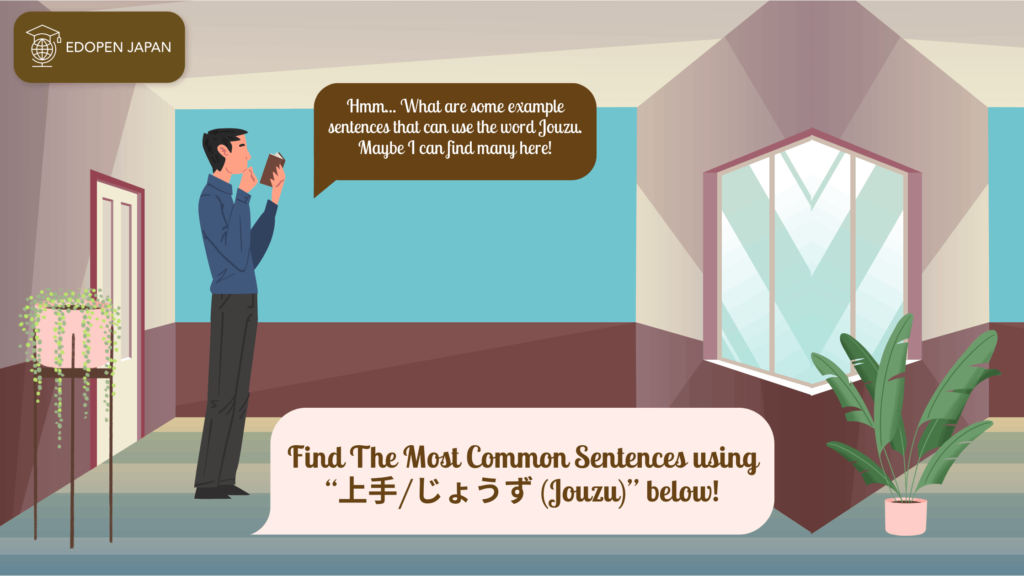Hello there! Are you looking for the best website to learn Japanese from scratch? Then our website is a home for you! Here on our website we provide many useful and easy Japanese guides that you can read within 5 minutes.
In this article, we will discuss one of the most interesting and important topics for those of you who study Japanese. This time we will be discussing a phrase that is very commonly used, and that you may also hear frequently from native Japanese speakers in everyday conversation. This phrase is 上手 (じょうず) or Jouzu.
The phrase 上手・じょうず (Jouzu) comes up a lot and is used in a variety of everyday Japanese conversations. What does it mean? Do you know how to write it in Japanese? In hiragana or kanji?
If someone says “jouzu” to you, how should you respond? So that you don’t make a mistake and end up with a misunderstanding later. Let’s learn the phrase “上手 or じょうず or Jouzu” together here!
In addition, you can also learn the famous and commonly used phrases in everyday Japanese conversation below:
Read also:
How to Use “かっこいい (Kakkoii)” Correctly in Japanese?
How to Use “Yoroshiku Onegaishimasu”?
The Meaning of Yabai (やばい)
Contents
What does “じょうず (Jouzu)” mean in English?

According to the Dictionary, “上手 or じょうず (Jouzu)” means the following and is pronounced as follows:
Jouzu – 上手 (じょうず): good, skillful, good (at), proficient, skilled, clever in Japanese.
Please take a look at the example below to get a quick understanding of Jouzu:
| Sentences in Japanese | Meaning in English |
| (1) 彼女は英語とフランス語が上手です。 Kanojo wa eigo to furansugo ga jōzudesu. | She is good at English and French. |
| (2) 武田先生は手術が上手です。 Takeda sensei wa shujutsu ga jōzudesu. | Doctor Takeda is good at surgery. |
| (3) 彼は字の書くのが上手です。 Kare wa ji no kaku no ga jōzudesu. | He is good at writing. |
Other than the above example, the use of Jouzu is very wide and varied. However, the meaning is very simple and clear, it is good at.
To know more detailed and clear, let’s continue reading the other section! In this article, we will explain to you many important things about Jouzu. Hopefully, you can implement and get new knowledge here.
Jouzu in ひらがな (Hiragana)
Are you a Japanese character lover? If so, let’s become friends! Learning Japanese characters would always be great and fun, right! If you have a deep interest in Japanese characters, taking time to read about them here would be great, I believe.
First of all, trying to understand the hiragana of Jouzu would be a good place to start.
The hiragana for Jouzu is じょうず, じ(Ji), ょ(small yo), う(u), and ず(zu).
Jouzu in 漢字 (Kanji)
After you know the hiragana, you need to know the kanji of Jouzu. Please read the explanation below:
- 上 (じょう, Jyo or Jō or Jou): a kanji represents the top, upper, above, beyond or over in the Japanese language.
- 手 (ず, zu): a kanji that means ‘hand’ in the Japanese language.
Since we can relate to the kanji, we can understand that the literal meaning of Jouzu is “Thumbs Up! (upper hand)”. Please note and remember that this kanji means clever, skillful, or good at something.
Multiple Ways to Read Jouzu in Kanji
Did you know that there are 10 more ways to read Jouzu in Japanese? Please see the detailed explanation below! We have concluded 7 ways to read the kanji Jouzu, the meaning as well as the example sentences as the following:
| Similar Words to Jouzu | Meaning in English |
| (1) じょうず(じょうづ、じやうず) Jōzu (Jōzu, Jiyauzu) * Usually Japanese say Jouzu with these ways | There are 2 meanings generally as follows: (1) Skillful ways of doing things, smart, phrase address to others. (2) Compliment. |
| (2) うわて Uwate | (1) The direction, position, location, ability, status with higher conditions. (2) A hand-inserted from above the opponent’s arm when they are paired in sumo. |
| (3) かみて(かみで) Kamite (Kamide) | (1) The upper one. The geographically high one. (2) Those who have water of the river flowing through it. Upstream of the river. |
| (4) うま(い) Uma (i) – umai or umaku | (1) Use to represent that the food is delicious. (2) Convenient and excellent technical skills. |
| (5) じょうて Joute or Jōte | Usually, the word “joute” is used as an idiom to write a specific word such as 上手物 or Joutemono which means to express a craft or good that did very well. |
| (6) じょうしゅ Joushu or Jōshu | Only used for an idiom called 上手契 or joshukei” which means one of the real estate contract methods in China. |
| (7) うえで Uede | Commonly used just as reading when expressing the person’s name or place name. |
What do you think? As you can see, the way of reading this simple kanji is not so simple, even it has 7 ways or even more? If you have any questions about this, please feel free to contact me anytime. Just leave a comment below.
The word “上手 or じょうず (Jouzu)” in JLPT
The word Jouzu with the kanji 上手 belongs to level N5 in the JLPT. This is the beginner level and the easiest level for Japanese learners.
The Most Common Sentences using “上手/じょうず (Jouzu)”

For a deeper understanding of the phrase Jouzu, please have a look at the common example of sentences below:
| Sentences in Japanese | Meaning in English |
| (1) カリンさんは教えるのが上手ですね。 Karin-san wa oshieru no ga jōzudesu ne. | Karin is good at teaching. |
| (2) 上手に研究発表をしましたよ。お疲れ! Jōzu ni kenkyū happyō o shimashita yo. O tsukare! | You made a good research presentation. Good Job! |
| (3) 彼女は話し上手です。 Kanojo wa hanashijōzudesu. | She is a good speaker/talker. |
| (4) そんなに日本語を話すのが上手ではないのです。 Son’nani nihongo o hanasu no ga jōzu dewanai nodesu. | I’m not that good at speaking Japanese. |
| (5) リンちゃんは絵を描くのがとても上手ですよ。 Rinchanha ewokaku no ga totemo jōzudesu yo. | Rin is very good at drawing. |
| (6) 母親はあまりケーキを作るのが上手ではないです。 Hahaoya wa amari kēki o tsukuru no ga jōzude wanaidesu. | Mothers are not very good at making cakes. |
| (7) 日本語が上手ですね! Nihongo ga jōzudesu ne! | You are good at Japanese! |
| (8) 彼はN1漢字を上手に書ける。 Kare wa N 1 kanji o jōzu ni kakeru. | He can write N1 Kanji well. |
| (9) さくらちゃんはギターが上手だというのは本当ですか。 Sakura-chan wa gitā ga jōzuda to iu no wa hontōdesuka? | Is it true that Sakura is good at playing the guitar? |
| (10) こんなに上手に漢字で手紙を書けるのにどうして日本語話せないですか? Kon’nani jōzu ni kanji de tegami o kakerunoni dōshite nihongo hanasenaidesu ka? | Why can’t you speak Japanese even though you can write letters in Japanese characters so well? |
Can you make your own sentences like the examples above? Please try and leave a comment below! I look forward to your response.
The Difference between 上手/じょうず (Jouzu) & 得意/とくい (Tokui)

You may hear the other word that has a similar meaning to jouzu, which is tokui (得意・とくい). Both jouzu and tokui are expressions of skill. Unfortunately, tokui is usually used to explain the ability of others or ourselves, and is close to someone’s ability. In contrast, jouzu is commonly used to explain the ability of others.
We can’t use jouzu for ourselves because jouzu usually works as a compliment or recognition of someone else’s work. Please see the 3 critical points below:
- 上手・じょうず (Jouzu), as well as 得意・とくい (Tokui), are the phrase to explain others’ proficiency and compliment to others.
- 上手・じょうず or Jouzu cannot be used to compliment yourself.
- 上手・じょうず or Jouzu is commonly used as a compliment for others, not yours.
In addition, 得意・とくい (tokui) represents non-specific skills, only general skills, while jouzu usually represents more specific skills and requires practice as well as special skills to become proficient. See the example below.
| Sentences in Japanese | Meaning in English |
| (1) Jouzu 彼女は絵を描くのが上手です。 Kanojo wa e o kaku no ga jōzudesu. | She is drawing very well. |
| (2) Tokui 私は料理が得意です。 Watashi wa ryōri ga tokui desu. | I am good at cooking. |
| (3) (Not Good) 私はデザインが上手です。 Watashi wa dezain ga jouzu desu. I am good at design. | (OK) 私はデザインが得意です。 Watashi wa dezain ga tokui desu. I am good at design. |
Please remember! You cannot use jouzu to explain your own ability. In that case, use Tokui instead!
The difference between 上手・じょうず (Jouzu) and 美味い・うまい(Umai)

上手・じょうず (Jouzu), like 美味い・うまい (Umai), is usually used to compliment someone. However, umai has a much broader meaning and nuance than jouzu. In addition, jouzu sounds more formal and polite, while umai is often used in casual conversation.
For jouzu, we can add the prefix O to the former phrase to become Ojouzu to show respect for someone’s work. However, we can’t add the prefix O or Go before umai. In addition, please review the following points for better understanding:
- Jouzu represents formal and polite compliments while umai represents more casual compliments.
- Jouzu is na-adjective while umai is an i-adjective.
- We can use Ojouzu but can’t use O for umai.
Next, please see the example below!
| Sentences in Japanese | Meaning in English |
| Example for 上手 (Jouzu) (1) 彼は野球が上手です。 Kare wa yakyū ga jōzudesu. (2) 彼女は歌を上手に歌う。 Kanojo wa uta o jōzu ni utau. | (1) He is good at baseball. (2) She sings well. |
| Example for 上手い (Umai) (3) リンちゃんは時計の修理が上手い。 Rinchan wa tokei no shūri ga umai. (4) 彼女は資金集めが上手い。 Kanojo wa shikin atsume ga umai. | (3) Rin is good at repairing watches. (4) She is good at raising funds. |
Learning to use Jouzu as a compliment

Exactly! Jouzu, as we mentioned before, is a phrase that is often used by the Japanese natives when they want to compliment others. When they want to describe the action that someone is good at or likes, they would present them with the phrase Jouzu. When I first spoke to the Japanese with my standard Japanese, they showered me with praise by saying the following:
日本語お上手ですね。
Nihongo Ojouzu desu ne.
That means You are good at Japanese with honorific nuance.
If you are learning Japanese and have a chance to talk to native Japanese people. Please try and practice with them, do not be shy! Obviously, you would get very kind respect as well as support to improve your Japanese language skills.
上手 (Jouzu) VS 下手 (Heta)
As you can see, the kanji for Jouzu (上手) and Heta (下手) are very similar. This is because the direct antonym of Jouzu is Heta (下手). The kanji Jouzu uses thumbs up! While the kanji Heta uses thumbs down. You can use Heta to describe someone who has low level skills. The literal meaning of heta is unskilled; poor; clumsy. Please remember this as well!
Japanese quotes that use the word “上手・じょうず (Jouzu)”

Learning Japanese would be a lot of fun if you could get closer to it in your own way. In my case, I often look for quotes and write as many as I can in my diary to cheer me up when I study. Below is my gift to you. Please remember and write down the one special quote below to help you remember the word Jouzu.
(だんだん上手になってくるよ!)
Dan dan jouzu ni natte kuru yo!
You’ll get better as time goes by!
Japanese proverb using “上手・じょうず (Jouzu)”
Not only the quotes, the other one of the best ways to remember the Japanese word is to learn the proverb. The Japanese proverb is very beautiful and yet meaningful. Please read the following 4 Japanese proverbs about Jouzu. Pick your favorite!
| Original Proverb in Japanese | Meaning in English |
| (1) 泳ぎ上手は川で死ぬ。 Oyogi jōzu wa kawa de shinu. | (1) A good swimmer dies in the river. This proverb is a parable of being overconfident in one’s own strength and failing or destroying oneself due to familiarity or strength. |
| (2) 上手の手から水が漏る。 Jōzu no te kara mizu ga moru. | (2) Water leaks from good hands. This proverb parable that even a good person sometimes makes a mistake. |
| (3) 好きこそ物の上手なれ。 Suki koso mono no jōzu nare. | (3) Be good at what you like. This proverb means people work hard on what they like, so they improve quickly. Because they like it, they naturally improve. |
| (4) 下手があるので上手が知れる。 Heta ga aru node jōzu ga shireru. | (4) Knowing something good because you know what is not good. This proverb is also parable to the existence of good people stands out because there are people who are not good at it. |
Conclusion
Last but not least, we can summarize this very insightful article about “上手・じょうず (Jouzu)” as the following points:
- The literal meaning of “上手・じょうず (Jouzu)” is “Thumbs Up! (Upper hand)”.
- “上手・じょうず (Jouzu)” is a Japanese phrase meaning clever, skillful, or good at something.
- There are 7 more ways to read the Kanji of 上手 (Jouzu).
- There are specific ways and conditions to use 上手 (Jouzu), 得意 (Tokui) and also 美味い (Umai).
- Learning “上手・じょうず (Jouzu)” would be much more fun with quotes and beautiful sayings. Do you remember them? Please check and choose your favorite above!
I hope this article is helpful and improves your understanding of Jouzu. Please leave your comment below for my improvement. Thank you for spending your valuable time reading my article. See you next time!













